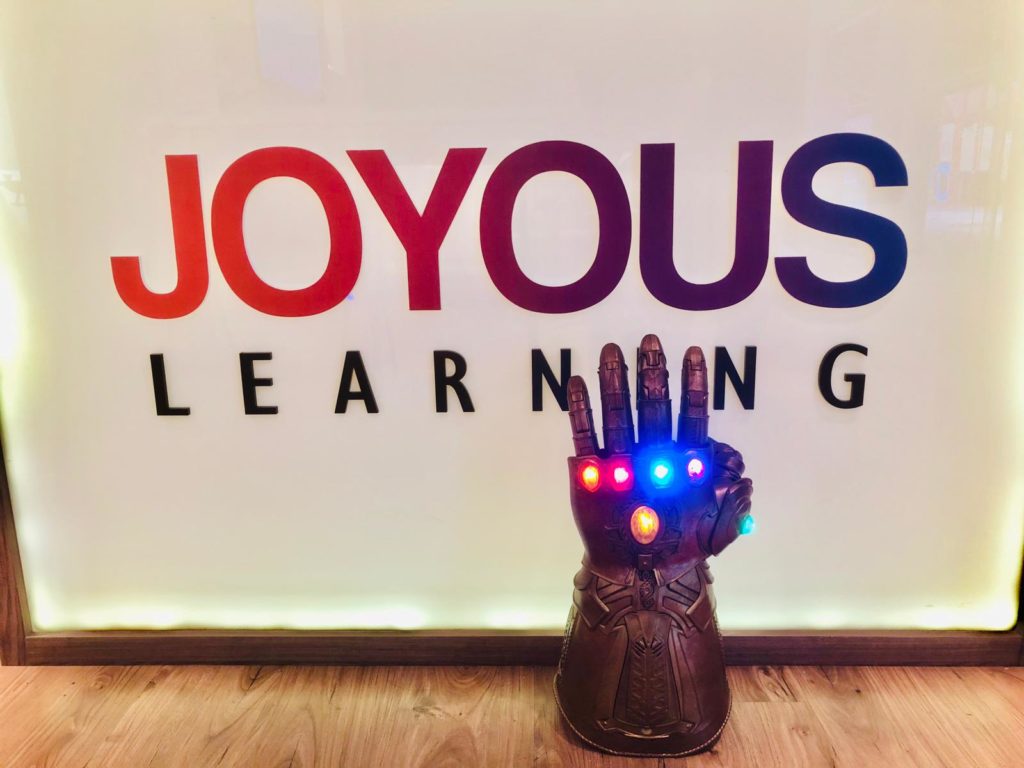
By Adrian Kuek (Joyous Learning) and Marcus Goh
If you’ve caught Avengers: Infinity War and Avengers: Endgame, the two biggest movie blockbusters of the Marvel Cinematic Universe, then you’ll definitely know what the Infinity Gauntlet is. In the two films, the Infinity Gauntlet is formed by assembling the six Infinity Stones, and it grants the wielder infinite power – which is why the villainous alien despot Thanos is after it. With the Infinity Gauntlet in his grasp, he can finally accomplish his evil plans.
The six Infinity Stones each represent an aspect of the universe, which are: Time, Space, Reality, Power, the Mind and the Soul. They each grant the wielder mastery over one aspect of the universe, and their combined power allows the wielder to do anything he or she wants. Over the course of 22 Marvel Cinematic Universe films, we’ve been slowly introduced to each of the Infinity Stones – and the unfathomable power that they contain.

But the Infinity Gauntlet isn’t just some plot device in an action film. It’s actually also a very good metaphor for learning. The six Infinity Stones represent all the qualities necessary for good learning to take place in Joyous Learning’s classrooms. Don’t believe us? Read on and find out.

1. Time
All students need time to learn. Whether it’s being introduced to the topic, understanding the information presented, or reviewing the knowledge they have learnt – time is essential for learning. This is especially pertinent when it comes to foundational knowledge – students need time to memorise certain basic information before they are able to comprehend higher order topics.
Time also relates to time management in exams. It’s a crucial skill that any test-taking student needs, because good time management means an exam paper is completed as efficiently as possible.

2. Space
Imagine being stuck in a cramped environment. Would you feel uncomfortable, or even claustrophobic? It’s difficult for good learning to take place when the environment just isn’t conducive for it to take place. Hence, the learning space is very important. Not only do students need the requisite elbow room and table space for their materials and stationery, they also need good lighting and a welcoming environment to learn.

3. Reality
It may be a bitter pill to swallow, but each student must also acknowledge how good they are in different subjects. As much as they may love a certain subject, they may not have the aptitude for it. Accurate diagnosis of a student’s ability in a subject will paint a much more realistic picture of a student’s overall abilities. From there, we can set realistic goals for students, so as to ensure they’re learning as effectively as possible.

4. The Soul
In Science, we often read about the spirit of scientific inquiry – which is to cultivate a healthy curiosity when it comes to investigating scientific concepts. However, you don’t just need a good attitude for Science – you need to have a good attitude towards learning in general. To truly cultivate the love of learning, it can’t just be a mental or emotional exercise. It has to come from within, from the soul. So developing the right attitude is important for good learning.

5. The Mind
With more examination questions moving towards the application of principles or the presentation of facts in varied ways, mental agility is often needed for students to convert their prior knowledge into the correct answers. This requires critical thinking skills and the ability to make connections between different concepts. It’s not an easy feat indeed, which is why the Mind must be honed well for good learning to occur.

6. Power
Learning is not easy, and it sometimes takes a lot of grit and determination before a student sees a significant breakthrough in their learning. Being able to deal with this and power through the difficult, sometimes discouraging times is the key to good learning. Some topics simply require a student to “pay their dues” and put in the requisite amount of time for mastery.

Now that you’ve seen how the Infinity Gauntlet applies to learning, which areas do you think can be improved to maximise your child’s learning? Let us know what you think about the different factors for good learning and how effective it’s been for you!
You may also want to read:
- [Movies] What does ‘Avengers: Endgame’ reveal about the future of the Marvel Cinematic Universe?
- [Movies] ‘Avengers: Endgame’ is a a beautiful capstone to one of the most ambitious and enjoyable shared movie universes
- [Movie Review] ‘Avengers: Infinity War’ delivers on all its promises — even if you know how it’ll (probably) end
- [Movies] Director Joe Russo: ‘Avengers: Infinity War’ is the most complicated movie in history
- [Movie Review] ‘Black Panther’ is part spy movie, part political drama
- [Movie Review] Supporting characters steal the show in ‘Captain Marvel’
Image credit: Pinterest
This article also appeared on Joyous Learning.
Adrian Kuek runs Joyous Learning, an enrichment centre that specialises in English, Mathematics, Science and Creative Writing for Primary. He previously served as the academic director of one of Singapore’s largest enrichment centre chains for over seven years. Send him an email if you’re keen!
Marcus Goh runs Write-Handed, a creative writing studio. At the same time, he teaches English at The Write Connection. He has been a specialist tutor for English and Literature (Secondary) since 2005.
Leave a Reply